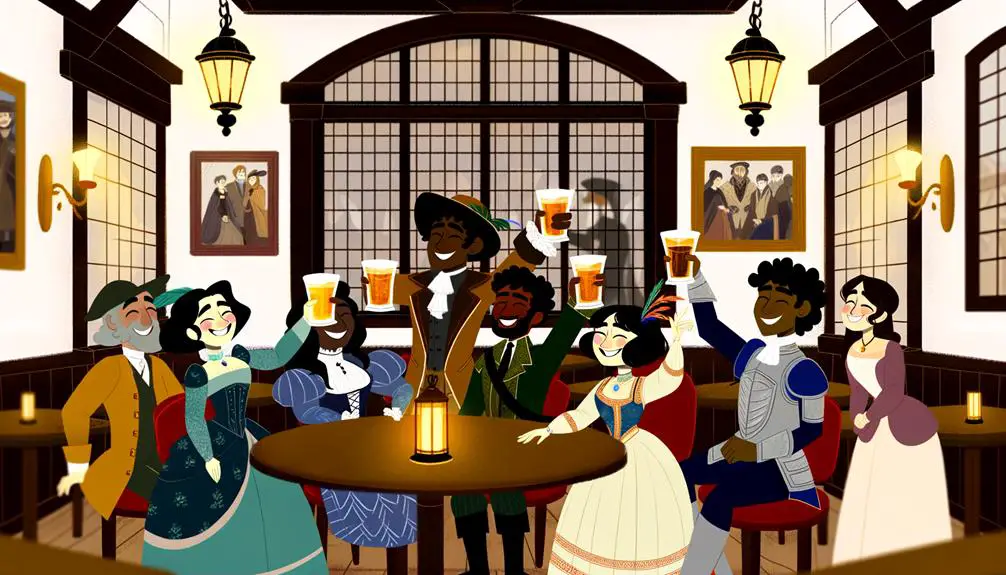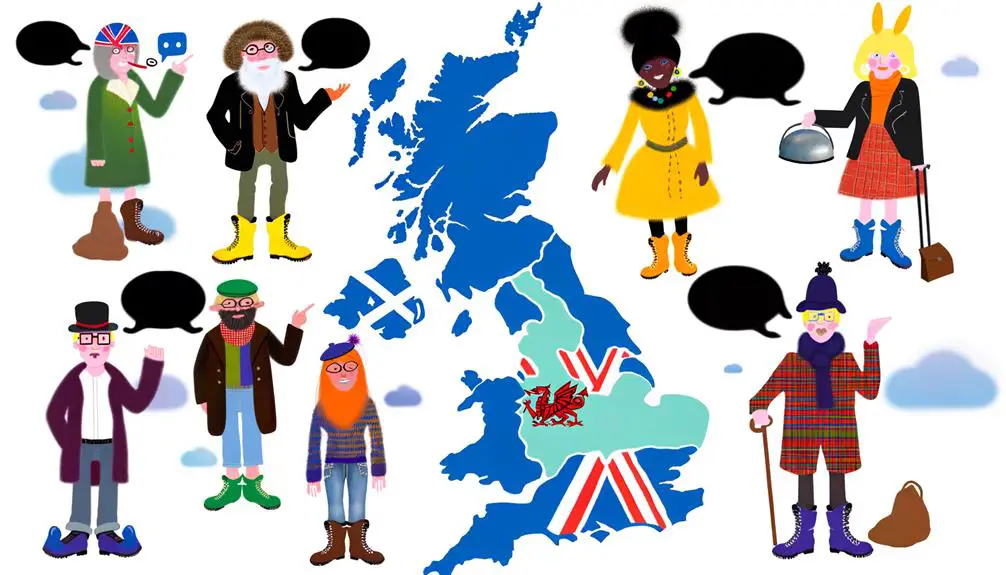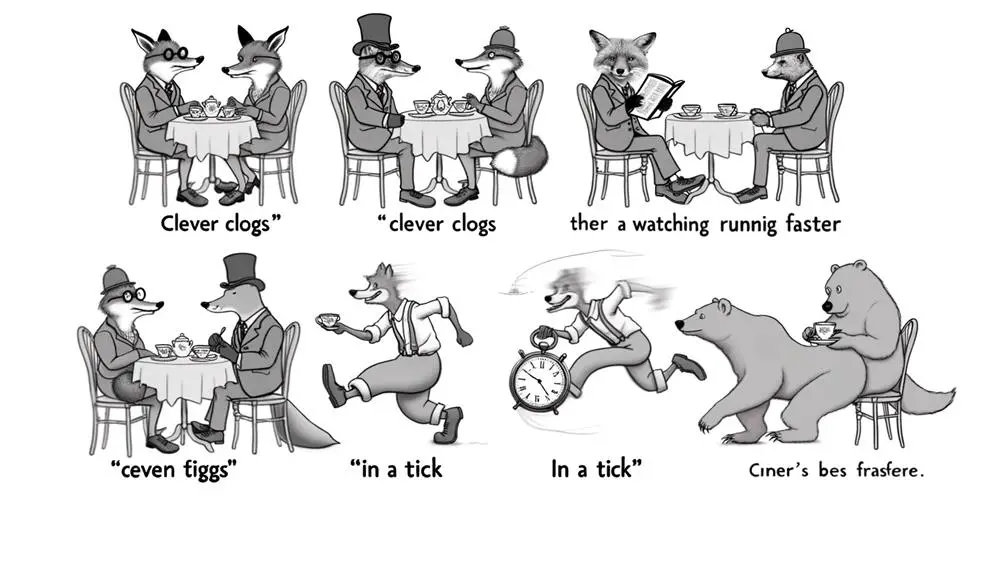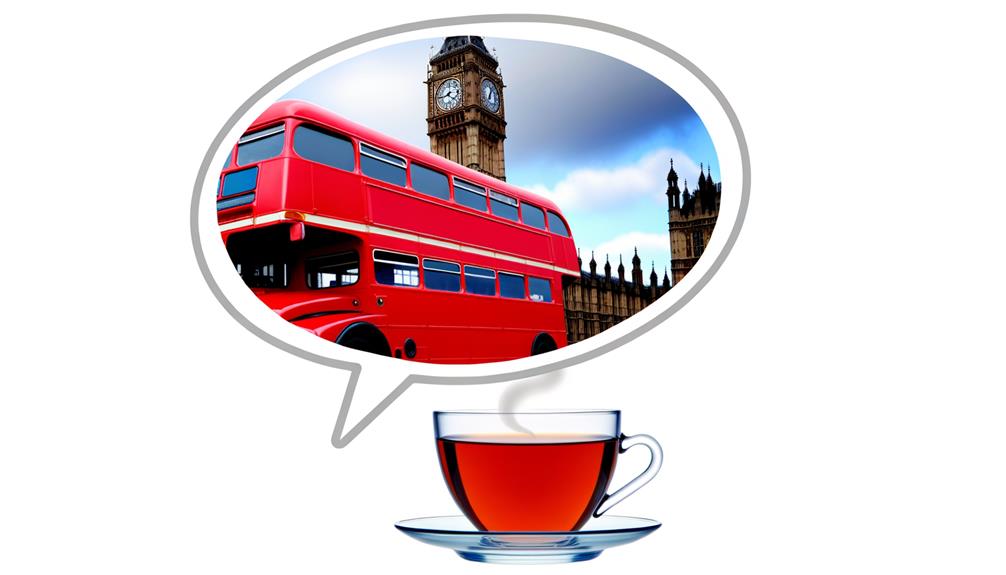In British slang, 'ta' stands as a succinct expression of gratitude, tracing its origins back to the early 18th century. This linguistic simplification, stemming from 'thank you', showcases the dynamic evolution of English influenced by the British Empire's global interactions. You'll find 'ta' permeating various aspects of daily life, reflecting an enduring preference for linguistic minimalism. Its widespread use, from casual exchanges in cafes to social media, illustrates the interconnectedness of language evolution and cultural practices. Comparatively, 'ta' embodies British tendencies towards brevity in contrast to international expressions of thanks. Exploring its regional variations and presence in popular culture further reveals the depths of this seemingly simple term. This journey into British slang discloses cultural nuances and linguistic richness awaiting your further exploration.
The Origins of 'Ta'

Delving into the origins of 'Ta', it's important to understand that this term, widely used as an informal expression of thanks in British English, traces its roots back to the early 18th century, embodying a fascinating linguistic evolution. The term's etymology is a demonstration of the dynamic nature of language, shaped by social interactions and cultural exchanges. The linguistic roots of 'Ta' suggest a simplification of the more formal 'thank you', evolving into a colloquial variant that emphasizes brevity and ease of use in casual conversation.
Analyzing the global influences on 'Ta', it's evident that the term's adoption and adaptation were likely influenced by interactions between English speakers and other cultures. During the period of the British Empire's expansion, English absorbed numerous words and expressions from languages around the world, leading to a rich tapestry of linguistic diversity within British English itself. 'Ta', with its succinctness and simplicity, may have been reinforced by similar expressions of gratitude found in other languages, further embedding it within the lexicon of British informal speech. This cross-pollination of linguistic elements underscores the interconnectedness of language evolution and cultural exchange.
'Ta' in Modern Usage
In contemporary British culture, 'Ta' serves as a confirmation of the enduring nature of linguistic simplicity, often used to express gratitude in a variety of everyday interactions. The term's pronunciation, a short, clipped sound, mirrors its straightforward meaning and function within the language. This brevity and ease of use contribute greatly to its widespread acceptance and utilization across various demographics within the UK. From casual conversations among friends to more formal exchanges in customer service scenarios, 'Ta' seamlessly fits into numerous communicative contexts, embodying a uniquely British blend of politeness and efficiency.
Analyzing 'Ta' from an academic standpoint reveals its role as more than just a linguistic relic; it's a living indication of the dynamic nature of language evolution and cultural adaptation. The global influence of British media and culture has facilitated 'Ta's' migration beyond the UK's borders, introducing it to international audiences. This global spread reflects not only the adaptability of English as a language but also the universal appeal of simplicity in communication. As a result, 'Ta' embodies a fascinating intersection of linguistic economy, cultural identity, and global interaction, making it a subject worthy of detailed exploration in the field of sociolinguistics.
Regional Variations

Exploring the landscape of British slang, you'll discover that 'Ta' exhibits intriguing regional variations, each reflecting the unique linguistic characteristics of its area. These dialectal differences aren't merely incidental; they're rooted in centuries of linguistic evolution, influenced by migration, local culture, and social dynamics.
When you investigate the specifics, linguistic mapping of 'Ta' across the UK reveals a fascinating patchwork of usage.
In some regions, 'Ta' functions as a casual yet heartfelt thank you, deeply embedded in everyday conversation. Elsewhere, its usage may be more formal, reserved for particular social settings or age groups. This variation isn't random but correlates with historical migration patterns, economic history, and even the influence of local industries which have shaped dialects and linguistic preferences.
For scholars and enthusiasts alike, understanding these regional variations requires a detailed analysis of linguistic surveys and firsthand accounts. Such studies illuminate how 'Ta,' a seemingly simple expression of gratitude, serves as a window into the complex tapestry of British dialects. Through this lens, you're not just learning about a word but exploring the rich linguistic diversity that defines the British Isles.
Comparison With Other Thank-Yous
While examining the regional variations of 'Ta' reveals much about the linguistic landscape of the UK, comparing it to other expressions of gratitude offers additional insights into the nuances of English politeness. 'Ta', as a casual form of thanks, sits within a broader context of global gratitude expressions, each reflecting its own cultural politeness norms.
| Expression | Cultural Context |
|---|---|
| Merci | French, conveys formal gratitude, widely recognized |
| Danke | German, used in formal and informal contexts |
| Arigato | Japanese, part of intricate politeness levels in language |
| Gracias | Spanish, universal in Spanish-speaking countries |
| Shukran | Arabic, reflects deep respect and appreciation |
This table demonstrates how 'Ta', in comparison, operates in a uniquely British informal domain, emphasizing brevity and understatement, traits valued in UK cultural politeness. Unlike 'Merci' or 'Danke', which serve across contexts, 'Ta' is distinctly casual, embodying the British tendency towards minimalism in verbal expressions of thanks. Understanding 'Ta' within the spectrum of global gratitude not only highlights its idiosyncratic place but also enriches our appreciation for the diversity in cultural expressions of thanks.
'Ta' in Popular Culture

Delving into popular culture, you'll find that 'Ta' pops up frequently, showcasing its integration into various facets of British life and media. This brief expression of gratitude has transcended its casual origins, embedding itself deep within the cultural lexicon, demonstrated through its ubiquitous presence across social media platforms and entertainment sectors. 'Ta' memes have flourished, often featuring quintessentially British scenes or humor, encapsulating the term's endearing simplicity and widespread acceptance. These digital snippets serve not only as vehicles of humor but also as cultural signifiers, reinforcing the colloquial charm of 'Ta'.
Moreover, the phenomenon of 'celebrity ta's' underscores the term's popularity. High-profile figures, from actors to musicians, have been captured using 'Ta' in interviews, on social media, and even during performances, lending it an air of glamour and further cementing its place in the popular vernacular. This celebrity endorsement has propelled 'Ta' beyond mere slang, elevating it to a symbol of British identity and communal kinship. Through this lens, 'Ta' emerges not just as a word but as a reflection of cultural values, embodying a blend of informality, politeness, and warmth that's characteristically British.
The Etiquette of 'Ta'
You must recognize that 'ta', while seemingly casual, plays a crucial role in expressing gratitude within specific British contexts.
Analyzing its usage reveals the nuanced etiquette behind this term, contingent upon the social setting and the relationship between the speaker and recipient.
Hence, mastering the subtleties of 'ta' can greatly enhance your interpersonal interactions across various British social landscapes.
Expressing Gratitude Properly
In British culture, mastering the etiquette of expressing gratitude, particularly through the casual yet meaningful use of 'ta,' reflects a nuanced understanding of social interactions. This vernacular form of thanks isn't merely a linguistic convenience but embodies a spectrum of gratitude gestures, each with its place and importance.
In more formal settings, or when a deeper level of appreciation is warranted, you might opt for thank you notes. These aren't just written acknowledgments but serve as tangible manifestations of gratitude, often embodying a personal touch that 'ta' can't convey.
Understanding when to use 'ta' and when to escalate to more elaborate forms of gratitude is vital. This discernment enhances the authenticity and depth of your thanks, aligning with British norms of courtesy and respect.
Social Contexts for Ta
Understanding the appropriate social contexts for using 'ta' illuminates the nuances of British social etiquette, highlighting when this casual form of gratitude best fits within various interactions. Misusing 'ta' can be perceived as dismissive or overly casual in formal settings, underscoring the importance of discerning the situation before employing such verbal shortcuts.
- In a bustling café, as a barista hands you your morning coffee, a cheerful 'ta' perfectly encapsulates your gratitude without delaying the line.
- During a quick transaction at a local shop, where brevity is appreciated, 'ta' serves as an efficient acknowledgment.
- Handing back a borrowed pen to a classmate, 'ta' expresses your thanks informally, fostering a friendly atmosphere.
Careful application of 'ta' demonstrates respect for the subtleties of social interactions, avoiding ta misuse and enhancing communication fluency in casual British contexts.
Beyond 'Ta': Other British Slang

You'll find that beyond the simple gratitude expressed by 'Ta', British slang encompasses a vast array of popular phrases and quirky expressions unique to the UK.
These linguistic variations serve not only as a means of communication but also as markers of cultural identity and social belonging.
Analyzing these expressions reveals insights into the dynamics of British regional dialects and the evolution of language in response to societal changes.
Popular British Phrases
Diving deeper into British colloquialisms reveals a rich tapestry of phrases that extend far beyond the simple 'ta' for expressing gratitude. These phrases, often reflective of the UK's cultural nuances, encompass a range of social interactions and daily routines.
Particularly, the concepts of cheeky banter and tea time are emblematic of British social dynamics, serving as keystones in understanding the intricate web of British slang.
- Cheeky banter: This term captures the light-hearted, playful exchange often found in British dialogue, embodying a quintessentially British form of humor.
- Tea time: More than just a beverage break, this phrase signifies a moment for pause, reflection, and social connection, deeply embedded in British culture.
- Queueing: A practice so pervasive, it has become a behavioral emblem, highlighting the British value of fairness and order.
Quirky UK Expressions
Delving deeper into the world of British colloquialisms, we come across a variety of quirky expressions that enrich conversations and reveal deeper cultural insights. These phrases, often emblematic of British banter and the spirit of cheeky chappies, play a pivotal role in the linguistic tapestry of the UK.
| Expression | Meaning | Context |
|---|---|---|
| Bob's your uncle | Everything's fine | Used to describe a situation resolved easily |
| Chuffed to bits | Very pleased | Expresses high levels of satisfaction |
| Skive | To avoid work | Employed when discussing truancy or work avoidance |
| Gobsmacked | Amazed | Used to convey surprise or shock |
Analyzing these expressions, we notice a blend of humor, understatement, and directness, which are hallmarks of British communication styles.
Frequently Asked Questions
How Does the Use of 'Ta' Affect Non-Native English Speakers' Understanding of British English in Professional Settings?
You might find cultural misinterpretation and language evolution at play, as the use of slang in professional settings can confuse non-native speakers, potentially leading to misunderstandings and challenges in effective communication.
Has 'Ta' Ever Been Incorporated Into Formal British Education Curriculums as a Part of Teaching Colloquial Language?
No, "ta" hasn't been woven into the fabric of formal British education curriculums. Despite language standardization efforts, curriculum integration of colloquial language remains selective, leaving "ta" outside the academic lexicon's embrace.
Are There Any Notable Controversies or Public Debates Surrounding the Appropriateness of Using 'Ta' in Governmental or Official Communications?
You'll find no significant controversies or public debates over using "ta" in official communications. Its use typically doesn't challenge official decorum or cultural implications, suggesting its acceptance within certain contexts doesn't spark widespread academic or analytical concern.
How Do Digital Communication Platforms and Social Media Influence the Spread and Acceptance of 'Ta' Among Younger Generations Outside the Uk?
Digital platforms boost 'ta's' global spread, with 70% of teens encountering it online. This cultural exchange, accelerated by emoji adaptation, showcases its growing acceptance, highlighting the pivotal role of social media in language evolution.
What Psychological Impact Does Using Informal Language Like 'Ta' Have on Interpersonal Relationships and Community Bonding Within British Society?
Using informal language strengthens emotional connections and community bonds. It shapes speech perception, fostering a sense of belonging. You'll find it enriches interpersonal relationships, making interactions more genuine and emotionally resonant within British society.
Conclusion
In sum, 'ta' embodies the quintessence of British linguistic simplicity and warmth. Its roots deeply entwined in the socio-cultural fabric, it flourishes in daily discourse, adapting with regional nuances and etching its presence in popular culture.
This token of gratitude, though brief, packs a punch in conveying appreciation, illustrating how language evolves yet retains its core function.
Beyond 'ta,' the lexicon of British slang offers a rich tapestry of expressions, each with its own story, mirroring the dynamic landscape of English vernacular.







